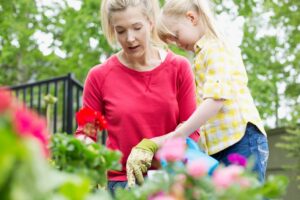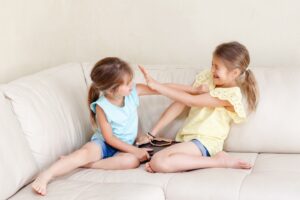The Essentials
The best age to start homeschooling your child is typically between 3-5 years old when they begin to develop essential skills like listening, following instructions, and showing interest in learning. Find out more here…
A preschooler needs to know the basics of language and literacy, math skills, social and emotional skills, fine and gross motor skills, and creative expression. More on this topic here…
To teach a preschooler at home, create a structured routine, set up a dedicated learning space, use a mix of learning styles, focus on play-based learning, and be patient and flexible while adapting to your child’s unique needs and learning style.
How to homeschool preschool is a topic that has gained popularity as more parents look for alternative ways to educate their children. With the right resources and support, teaching your preschooler at home can be an enriching and rewarding experience. In this blog post, we will explore various aspects of homeschooling a preschooler, including how to teach them at home, the best age to start homeschooling, and what your preschooler needs to know.
Table of contents
The Importance of Early Childhood Education

Teaching children before they begin formal schooling is crucial in laying a solid foundation for their future academic success and overall well-being. Early childhood education plays a vital role in a child’s cognitive, social, and emotional development. Parental involvement in this process is essential, as parents are the primary educators and caregivers during the early years of a child’s life. So why is childhood education so important for a child’s later life? Here are some reasons:
- Cognitive development
- Brain development: The early years are a critical period for brain development, and positive learning experiences during this time can have lasting effects on a child’s cognitive abilities, including memory, attention, and problem-solving skills.
- Language and literacy: Early exposure to language, reading, and writing helps children develop essential communication skills, leading to better academic performance and increased opportunities for success later in life.
- Mathematical skills: Early introduction to basic math concepts, such as counting, shapes, and patterns, helps children develop a strong foundation in numeracy, which is essential for success in various fields and daily life tasks.
- Social and emotional development
- Emotional regulation: Early childhood education helps children learn to recognize, express, and manage their emotions, leading to better mental health and resilience in the face of challenges.
- Empathy and social skills: Early learning environments foster the development of empathy and social skills, such as communication, cooperation, and conflict resolution, which are crucial for forming healthy relationships and navigating social situations throughout life.
- Self-esteem and self-confidence: Positive early learning experiences help children develop a strong sense of self, building self-esteem and self-confidence, which are essential for personal growth and fulfilling relationships.
A study conducted by the National Home Education Research Institute found that homeschooled preschoolers scored significantly higher than their peers in public schools on assessments of academic ability and emotional development.
- Academic success
- School readiness: Early childhood education prepares children for the transition to formal schooling by instilling essential skills, such as listening, following instructions, and problem-solving, which contribute to academic success.
- Love for learning: Providing engaging and enjoyable learning experiences early on can instill a lifelong love for learning and curiosity in children, leading to a more fulfilling academic journey and personal development.
- Life skills
- Independence and responsibility: Early childhood education encourages children to develop independence and responsibility, equipping them with crucial life skills for success in various aspects of life, including work, relationships, and personal growth.
- Creativity and problem-solving: Early learning environments nurture children’s creativity and problem-solving skills, promoting innovative thinking and adaptability in the face of challenges and change.
- Healthy habits: Early childhood education also provides opportunities for children to develop healthy habits, such as physical activity, nutrition, and hygiene, which can have long-lasting effects on their physical and mental well-being.
The Appropriate Age

There are certain factions that need to be taken into account before you start homeschooling your child. The factors to consider are the following:
- Developmental milestones
The best age to start homeschooling your child largely depends on their individual development and readiness for learning. Most children are prepared for a homeschool preschool experience around the ages of 3-5 years old. This is when they begin to develop essential skills such as listening, following instructions, and showing an interest in learning. Keep in mind that every child’s developmental milestones will vary, so it’s essential to observe your child and determine when they are ready to start homeschooling.
- Social and emotional readiness
In addition to cognitive readiness, it’s important to consider your child’s social and emotional development. Before starting homeschooling, ensure your child is capable of engaging in age-appropriate social interactions and can express their feelings and needs effectively. This will help ensure a smooth transition to homeschooling and promote healthy social and emotional development.
Did You Know?
Homeschooling preschoolers allows parents to tailor their child’s learning experience to their unique needs and interests, providing a more personalized and engaging educational experience.
- Parental readiness
Starting homeschooling requires a significant commitment of time, energy, and resources from parents. Before deciding on the ideal age to begin homeschooling, assess your own readiness and ability to provide consistent, high-quality educational experiences for your child. This includes evaluating your availability, knowledge of teaching methods and learning styles, and access to resources and support networks.
- Legal requirements
Laws and regulations surrounding homeschooling vary depending on your location. Some regions have specific age requirements or reporting obligations for homeschooling families. Before starting homeschooling, research your local regulations to ensure compliance and determine the best age to begin, based on the legal framework.
What should be taught?

- Key competencies that should be taught by parents
a. Language and literacy: Encourage the development of language skills by talking, reading, and singing with your child. Expose them to a rich vocabulary and a variety of reading materials.
b. Numeracy: Introduce basic mathematical concepts like counting, shapes, and patterns through fun and interactive activities, such as playing with blocks or sorting objects.
c. Social and emotional skills: Teach your child essential social and emotional skills, like sharing, taking turns, and expressing their feelings, through modeling, role-playing, and daily interactions.
d. Fine and gross motor skills: Engage your child in activities that promote the development of both fine and gross motor skills, like drawing, painting, and playing with playdough, as well as running, jumping, and climbing.
e. Creativity and imagination: Encourage creative expression through various art forms, like drawing, painting, music, and dramatic play.
Did You Know?
The flexibility of homeschooling allows parents to incorporate cultural, religious, or personal values into their child’s education, providing a unique and diverse learning experience.
- Age-appropriate teaching strategies
a. Infants (0-12 months): Focus on sensory experiences and secure attachments. Engage your baby in activities that involve touch, sound, smell, and sight. Establish a strong bond through cuddling, talking, and singing to your baby.
b. Toddlers (1-3 years): Encourage exploration and independence while providing a safe and nurturing environment. Offer opportunities for hands-on learning, such as playing with age-appropriate toys and materials, and provide choices for your child to make decisions.
c. Preschoolers (3-5 years): Promote curiosity, problem-solving, and creativity through play-based learning. Introduce more structured learning activities, like reading, counting, and engaging in art projects, while still emphasizing the importance of play.
How to Teach

Teaching preschoolers at home can be a rewarding experience for both parents and children. However, it requires careful planning and consideration of different techniques, media, and books to ensure a successful and engaging learning environment.
- Focus on Play-Based Learning
Play-based learning is an effective technique for teaching preschoolers as it incorporates hands-on, interactive, and imaginative activities. Children learn best through play, so incorporating educational games, puzzles, and activities that promote problem-solving, creativity, and social skills is crucial.
- Use Multiple Learning Styles
Preschoolers have different learning styles, and it is essential to cater to their individual preferences. Incorporating visual, auditory, and kinesthetic activities can help keep children engaged and excited about learning. This can include using flashcards, reading aloud, and engaging in hands-on activities.
- Provide a Structured Routine
Establishing a routine is essential in providing children with a sense of security and predictability. Plan activities and lessons around a daily schedule that includes time for play, learning, and rest. A structured routine also helps parents manage their time effectively and ensure that learning goals are met.
- Set up a Dedicated Learning Space
Having a designated area for learning and play will help your child focus and minimize distractions. Ensure that the space is comfortable, well-lit, and equipped with age-appropriate materials. A dedicated learning space also helps establish boundaries and routines, making it easier for children to focus and engage in learning.
THomeschooling preschoolers can help children develop a love for learning and a lifelong curiosity, laying a strong foundation for future academic success and personal growth.
- Use Interactive Media
Interactive media such as educational games, videos, and websites can be useful tools for teaching preschoolers. However, it’s important to ensure that the media is age-appropriate, educational, and engaging. Limit screen time and encourage children to interact with the media actively rather than passively consuming it.
- Select Appropriate Books
Books are a valuable resource for teaching preschoolers as they promote language and literacy skills, imagination, and critical thinking. Choose books with colorful illustrations, simple language, and engaging storylines. Use books to introduce new concepts and vocabulary, spark discussions, and inspire creativity.
What to Pay Attention to:
- Attention span: Preschoolers have short attention spans, and it is important to keep activities and lessons brief and engaging.
- Individual learning styles: Observe your child’s individual learning style and tailor activities and lessons to their preferences.
- Patience and flexibility: Remember that each child is unique and may require different teaching methods or pacing. Stay patient, and don’t be afraid to adjust your approach if needed.
- Safety: Ensure that the learning environment is safe and free from hazards, especially when using materials such as scissors, glue, and paints.
Homeschooling – Challenging but Rewarding!
Homeschooling your preschooler can be a fulfilling and enjoyable journey for both you and your child. By creating a structured routine, setting up a dedicated learning space, and focusing on essential skills, you can provide your preschooler with a solid foundation for lifelong learning. Remember to remain patient, flexible, and open to adapting your approach as needed to cater to your child’s unique needs and learning style. Happy homeschooling!














